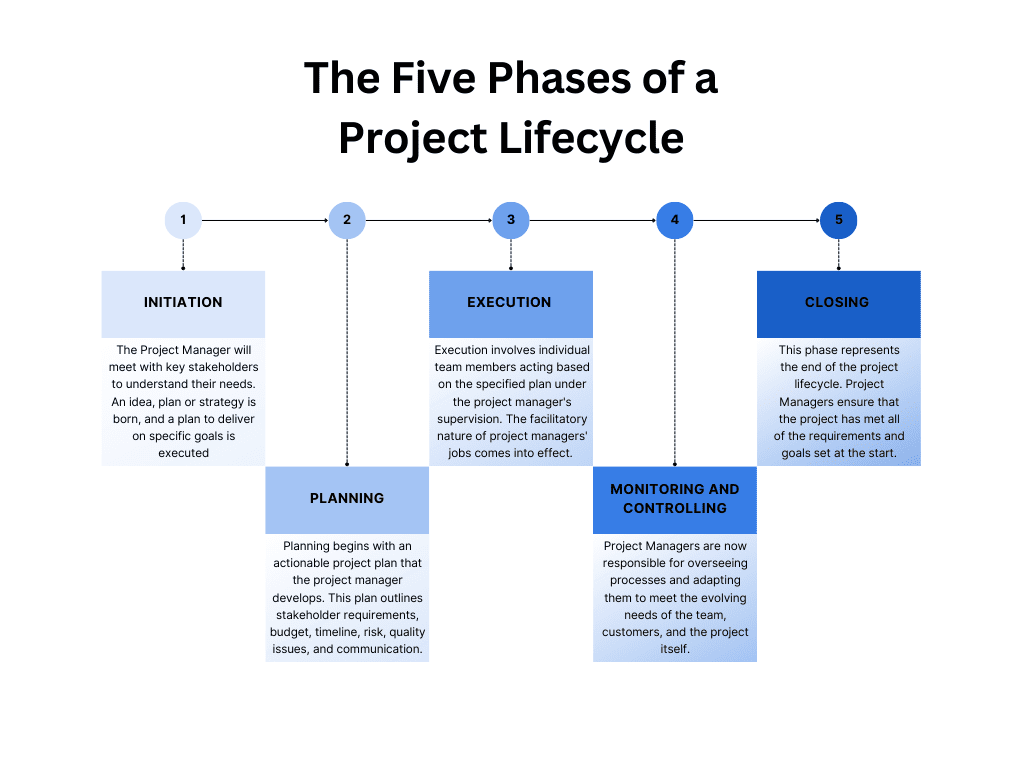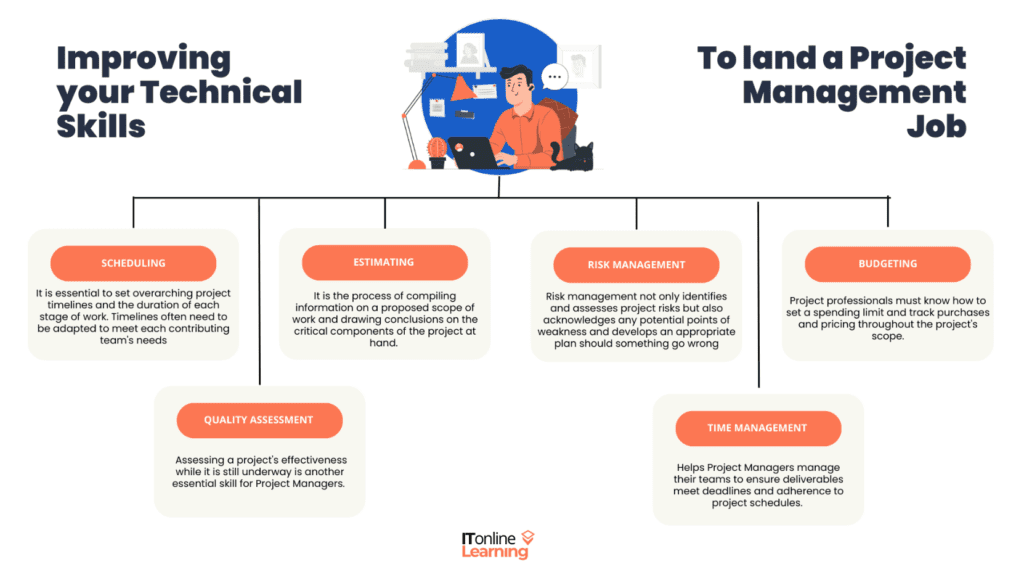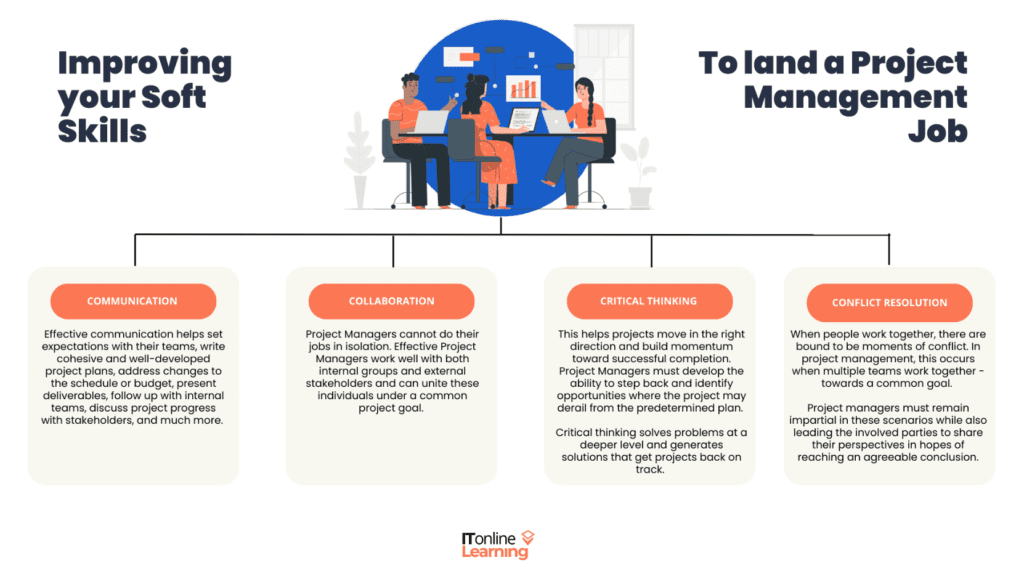
How to Become a Project Management Professional
Are you interested in a Project Management career?
Have you researched the Project Management career path and concluded that you would also like to work in this exciting field that offers endless opportunities for professional growth?
A career in Project Management can offer you a lot, like, working on exciting projects with talented and experienced professionals and the opportunity to build in-demand Project Manager skills (that we cover in detail below).
Then you are right to be interested in becoming a Project Management Professional!
Project Management professionals are some of the most sought-after in the UK job market.
Project Management jobs are also some of the highest-paying jobs available in the UK market today – with substantial starting salaries, and steady pay rises consistently across the board.
Consider this blog post your cheat sheet to becoming a skilled, knowledgable and well-paid Project Management Professional!
What is a Project Manager?
A Project Manager is many things when you consider the scope of their role.
They are responsible for the planning, procurement, execution, and completion of projects; they are responsible for managing entire projects and handling the many moving parts involved – such as the project scope, managing the project team, and including resources assigned to the project.
These professionals, (along with other project specific roles on the team) are involved in many parts of a project – start to finish.
However, if we were to boil it all down, it would be this: The Project Manager is ultimately responsible for the success or failure of a project.
Besides the technical aspects of managing projects, these professionals are tasked with leading, providing leadership and moral support to their teams (These are less quantifiable but equally as important).
The Fundamentals of Project Management
Success in this field requires a solid understanding of the fundamentals that encompass Project Management.
Let us cover these fundamentals in this section.
As mentioned, a PM (Project Manager) oversees the completion of a project – from start to finish. They use their skills and knowledge to set work goals and objectives, budgets and timelines, and facilitate communication across teams.
And while their work might appear facilitative and not actionable, that is far from the case. Within a project life cycle, project management professionals have obvious and actionable responsibilities they are accountable for. We can understand this within the confines of a project lifecycle, consisting of five key phases.
The Five Phases of a Project Lifecycle
Each phase requires to draw on different aspects of ones professional expertise, while working toward completing a series of phase-specific duties.
Initiation
Expectations are set in this phase as Project Managers meet with key stakeholders to understand their needs and help shape the project scope.
Planning
Once initiation is complete, planning begins with an actionable project plan that’s developed. All parties involved will follow this plan during the project duration.
Typically, this plan outlines stakeholder requirements, budget, timeline, risk, quality issues, and communication.
Execution
Involves individual team members acting based on the specified plan under the project manager’s supervision.
At this stage, the facilitatory nature of project managers’ jobs comes into effect.
They support their teams through the following:
- Time management
- Facilitating communication between teams
- Streamlining processes and
- Consistently adapting the project scope statement to reflect any changes during execution.
Monitoring and controlling
At this fourth stage, the Project Lead oversees processes and adapts them to meet the evolving needs of the team, customers, and the project itself.
Project Managers ensure that project timelines are being adhered to and track the timely execution of deliverables, respecting allocated budgets and reaching key milestones.
Closing
This phase represents the end of the project lifecycle.
Project Leaders ensure that the project has met all of the requirements and goals set at the start.
Archiving files or deliverables for future reference and closing contracts with third-party vendors or consultants are other tasks completed during this final stage.

What Is the Importance of Project Management?
Good project management equals good business!
When done right, project management helps every part of the business run smoothly. Team members are freed from distractions that result in delays, tasks going off track, or budgets spinning out of control.
Effective Project Management empowers people to focus on delivering results that impact the business’s bottom line. Unsurprisingly, the best companies build strong project management teams to help deliver successful projects consistently.
Hopefully, you can see how pursuing a Project Mnagaement career can be massively gratifying because of the impactful work you can do.
What Are the Common Responsibilities in a Project Management Role?
Planning
A primary responsibility for people in Project Management roles is to ensure the successful delivery of the project.
This happens by creating comprehensive plans aligning with the project objectives and adhering to the approved budget and schedule.
This plan acts as a roadmap for the project, starting from initiation and guiding it through to completion. It outlines the project scope, required resources, schedule, budget, communication strategy for stakeholders, execution plan, and post-implementation follow-up and maintenance proposal.
In cases where the project is still waiting for approval, this plan serves as a crucial component of the pitch to key decision-makers. By presenting a well-defined and executable strategy, project professionals can manage the project and deliver outstanding results effectively.
Leadership
Project roles also require leading people; often, this includes assembling, leading, and monitoring a high-performing project team.
Exceptional communication skills and the ability to read people and identify their strengths and weaknesses are required.
Once the team is in place, tasks are assigned, deadlines are established, and regular communication with each team member is monitored and supervised.
By doing so, Project Management professionals can ensure that the project is on track, everyone is working towards a common goal, and the team remains motivated and productive.
Execution
Senior roles in Project Management oversee the successful execution of each stage of the project.
This involves maintaining open and effective communication with all stakeholders to ensure that everyone knows the project status, any potential risks or issues, and the steps taken to address them.
Effective supervision aims to keep the project on track, meet its objectives, and ensure its completion.
Time Management
Keeping projects on schedule is a critical function of Project Management professionals.
If issues arise, Professionals must identify solutions, communicate effectively with the project team and stakeholders, and take necessary actions to get the project back on track.
Additionally, being an expert in risk management and contingency planning is a critical aspect for senior Project professionals.
Anticipating and mitigating potential roadblocks by proactively developing contingency plans that help circumvent these challenges is required.
By doing so, Project Management professionals ensure the project remains on schedule, meets its objectives, and delivers outstanding results.
Budget
You will be responsible for creating budgets for the project and ensuring their implementation. Suppose there are unexpected costs associated with certain aspects of the project. In that case, professionals must take proactive measures to manage spending and reallocate funds accordingly.
The effective management of project finances is the responsibility of professionals in the Project Management office. Managing these finances needs to be approached with a high degree of professionalism.
Documentation
For Project Management professionals, monitoring and analysing the project’s progress to ensure it is proceeding according to plan is essential to the job.
To accomplish this, professionals employ various techniques such as data collection and regular status reporting through verbal and written updates.
What are the Core Components of the Project Management Sector?
Integration
Integration management encompasses a range of processes designed to ensure seamless coordination of various project elements.
It necessitates making informed decisions regarding conflicting objectives and evaluating alternative options to meet or exceed stakeholders’ expectations.
Scope
Defining project boundaries, including the classification of expenses such as equipment rentals, employee salaries, tool purchases, and others as either being within or outside the project scope, is an important responsibility.
This is because scope definition problems are the leading cause of project difficulties.
Creating a comprehensive and well-defined scope statement and adhering to the SMART criteria of specificity, measurability, attainability, relevancy, and temporal boundaries is essential in avoiding project distress and ensuring project success.
Time
Given that projects have a finite lifespan, developing a comprehensive project schedule is crucial. Deadlines often require input from external stakeholders, making effective communication of project milestones and deadlines imperative.
Microsoft Project is a widely utilised tool for schedule creation and a graphical representation, while industry-specific project management software such as Primavera P6 (used in construction) is also available.
Cost
As projects are temporary, establishing a clear and well-defined budgets is essential.
Project Manager’s responsibility involves managing the budget and ensuring cost containment. For projects, the more vigilant control over project costs there is, the less likely that potential overruns occur.
Quality
Identifying quality standards for a project is crucial and should be documented in a detailed list. Relevant industry standards can serve as a helpful reference in determining quality success criteria.
Quality management encompasses several interrelated components, including the determination of quality standards, the development of a strategy to meet or exceed those standards through quality assurance, and evaluating quality through quality control.
Procurement
For projects to succeed, it is crucial to have a procurement plan as a component of your project plan.
This plan outlines the process for acquiring any necessary external resources and establishes a mechanism for monitoring their quality.
To effectively communicate your requirements, it is common to develop a comprehensive document that details the scope of work to be performed by a contractor.
This document may be referred to as a Statement of Work, Terms of Reference, Request for Proposal, or a similar variation, depending on the industry and specific project needs.
Human resources
Building a strong and effective team is critical to executing projects successfully. Whether you’re drawing from within your organisation or looking to bring on new hires, forming a high-performing team takes significant effort and time.
To ensure success, it helps to include a comprehensive human resources plan in your project plan.
This plan should outline your resource requirements, including the roles and responsibilities of each team member.
It should also address the acquisition process, including any hiring and onboarding efforts. To support your team’s success, the plan should include training and development provisions, as well as strategies for effective management and monitoring of productivity.
Risk Management
Working in the project management sector means being proactive and well-prepared for potential challenges.
Maintaining a risk register that identifies the most significant risks to the project’s success can help you stay ahead of any potential issues.
The risk register should consider the likelihood of a risk occurring and its potential impact on the project.
Having a clear and thorough response plan is equally important in risk management. The response plan outlines the steps to take to mitigate potential risks and the individuals who would be involved in the response.
By proactively addressing potential risks, you can ensure smoother project execution and increase the chances of successful project completion.
Stakeholder Management
Excellent communication skills are a weapon and can be used strategically with stakeholders.
However, it is a delicate balance between knowing when to reach out about potential issues and when to hold back.
Understanding your stakeholders’ expectations is vital, and ensuring expectations are met successfully within the scope of your project is a top priority. After all, even if you consider a project a success, it won’t mean much if your stakeholders aren’t satisfied.
What Are the Skills Required To Land a Project Management Job?
2.2 million people!
Each!
Year!
The number of people projected to be needed each year until 2027 to fill Project Management jobs!
That’s according to research from the Project Management Institute.
Such numbers are unheard of in other sectors. No wonder people are exploring the Project Management career path and building the core skills needed to become a Project Manager.
Technical Skills
1. Scheduling
It is essential for Project Managers, especially, to set overarching project timelines and the duration of each stage of work. Timelines often need to be adapted to meet each contributing team’s various needs, time constraints, and abilities.
2. Estimating
It is the process of compiling information on a proposed scope of work and drawing conclusions on the critical components of the project at hand. Examples of these estimates include anticipated project costs, resources, and project duration.
3. Risk management
Each project undertaken involves an element of risk. Risk management not only identifies and assesses these risks but also acknowledges any potential points of weakness, weighing the chances of a damaging setback to the project based on those weaknesses and developing a proper mitigation plan for getting the project back on track if trouble occurs.
4. Budgeting
Keeping every aspect of a project within the allocated budget is a key Project Management skill that’s expected. Project professionals must know how to set a spending limit and track purchases and pricing throughout the project’s scope.
5. Quality Assessment
Assessing a project’s effectiveness while it is still underway matters greatly for the successful completion of projects. Critical to this is determining, and then measuring against a clear set of standards the project should follow.
6. Time Management
Helps Project Managers manage their teams to ensure deliverables meet deadlines and adherence to project schedules. Important: Time management skills can, and must be continuously improved for productivity and effectiveness.

Soft Skills
1. Communication
At any stage of their careers, communication is the most crucial skill to Project Management professionals. Effective communication helps set expectations with their teams, write cohesive and well-developed project plans, address changes to the schedule or budget, present deliverables, follow up with internal teams, discuss project progress with stakeholders, and much more.
Communication is an important skill to hone when working on projects – as part of a project team – this includes verbal, written, and nonverbal communication skills such as reading body language or the tone of the room.
2. Collaboration
Project Management jobs cannot be done in isolation. Professionals that are effective at their jobs work incredibly well with both internal groups and external stakeholders and can unite these individuals under a common project goal.
3. Critical Thinking
Helps projects move in the right direction and build momentum toward successful completion. Senior staff must develop the ability to step back and identify opportunities where the project may derail from the predetermined plan.
Critical thinking solves problems at a deeper level and generates solutions that get projects back on track.
4. Conflict Resolution
When people work together, there’s bound to be conflict. In project management, this occurs when multiple teams work together – towards a common goal.
Project managers, especially, must remain impartial in these scenarios while also leading the involved parties to share their perspectives in hopes of reaching an agreeable conclusion.

How To Gain These Skills at the Entry-Level
The skills mentioned above are quite comprehensive, and it can be overwhelming to think about which ones to improve and how.
Completing a self-analysis helps determine what skills you’re already bringing to the table and which you need to improve before applying. For people interested in becoming a Project Manager, asking questions similar to these can encourage self-reflection:
- Can I speak candidly with individuals on various levels within an organisation?
- Can I bridge the gap between teams to facilitate high-value conversations?
- Am I comfortable presenting in front of a group and public speaking?
- Am I a people person? Do I like working in teams, or would I prefer working individually?
Analyse your answers, along with your work history up to this point, to get a sense of what skills need the most attention from you.
For example, if switching to Project Management from another field, you will likely possess the interpersonal skills required to work in a Project Management role and with project teams.
Important: No matter your specific background, remember to acknowledge where your abilities could be improved and take the necessary steps to fill those gaps.
The Five Tiers of Project Management Jobs – And Where You Can Expect To Start Out
Job titles can get confusing in the Project Management field. For one, you can have three to four entry-level Project roles.
However, a hierarchy of roles you will likely occupy as you advance in your career can be categorised into the following five:
Project Coordinator: This entry-level administrative position, known as Project Coordinator, entails generating and disseminating reports to the project team, stakeholders, and relevant parties, while also serving as general support to the management team.
Project Scheduler: This position, known as Scheduler, is typically utilised for large-scale projects and involves using scheduling software and related tools to input data and maintain accurate records.
It requires a strong technical aptitude and proficiency with computer systems, although minimal management responsibilities are involved.
Assistant Project Manager: The title of Assistant Project Manager may not accurately reflect the full scope of the role, as direct assistance to the Project Manager may only sometimes be required.
The individual in this role is accountable for overseeing specific tasks and regularly convenes with the Project Manager to provide updates on progress and address any arising issues.
Project Manager: A Project Manager is responsible for leading and executing projects independently or as part of a management team.
This may involve delegating tasks to assistants, presenting progress updates to stakeholders, monitoring budgets and schedules, and ensuring the successful completion of projects.
Senior Project Manager: In larger organisations, this role is comparable to that of a Program Manager, as it involves the management of multiple concurrent projects, as well as determining their relative priority levels.
Introducing The ITonlinelearning Project Management Career Programme
What Is the Project Management Career Programme?
Think of the ITonlinelearning Placement Programme in Project Management as a “hold you by the hand” training and support programme where we first – help you become qualified in core Project Management Qualifications, then provide you with recruitment support to find your first entry-level role in Project Management (guaranteed or your money back)!
There’s more – during your training with us, we’ll assign you a specialist mentor and tutor to help guide and provide support so you complete – and pass your exams.
This career programme focuses on helping you get qualified AND get placed into the industry you want to work in as quickly as possible!
This is what makes it different! It is why previous students (now working professionals) recommend it so much.
How This Career Programme Is Structured
Becoming a Project Management professional begins with getting qualified with globally recognised certifications (PeopleCert & Axelos). Your journey will begin with:
Becoming Project Management Fundamentals qualified.
The Project Management Fundamentals course will teach you the fundamental skills and knowledge needed to lay the foundations of a successful and lucrative career in Project Management.
Becoming PRINCE2® Foundation qualified.
The PRINCE2 Foundation course explains one of the world’s leading methodologies. This course will lay the groundwork for a successful Project Management career.
Becoming AgilePM Foundation qualified.
This flexible methodology is popular and growing across the world. It offers an adaptable framework that’s sought after, especially in sectors that create new products and services.
Becoming Change Management Foundation qualified.
Understand the techniques and approaches to prepare an organisation and its employees for change. All projects result in change, which needs managing to help people thrive.
Becoming PRINCE2® Practitioner qualified.
The PRINCE2 Practitioner course is the second level of training. To manage more complex projects, you will require the skills and knowledge learned from the Practitioner course.
Becoming AgilePM Practitioner qualified.
AgilePM Practitioner is the second level of this popular methodology. To be a Project Manager using AgilePM, you must build on your foundation-level skills with this Practitioner course. Many companies use a hybrid of AgilePM and PRINCE2.
The Project Management Career Programme is an all-encompassing training, and career development solution focused on getting you a job. We do this through specialist support with the following:
- A Job/Money-back guarantee.
- Minimum of 5 official exams.
- Progress from Foundational to Practitioner level.
- Support from a team of experts knowledgeable in Project Management.
- Recruitment support to land a job in Project Management & professional CV review.
- Gain experience managing simulated projects.
- Personalised study plan upon request.
- Globally accredited courses and qualifications.
- One year of access to six UK-accredited courses.
- Flexible finance options are available.
Become a Project Management Professional!
With ITonlinelearning’s Project Management Career Programme, NOW YOU CAN!
We are the only career programme that helps you gain the qualifications for the career you want AND also finds you an entry-level job in the sector you desire.
Guaranteed or your money back!
We are an APMG International and PeopleCert partner, meaning you have access to only accredited courses and study materials when you study with us.
Our career programmes are 100% quality content – recognised and endorsed globally by practising professionals.
Interested but require financial assistance? Ask us about the option to spread your payments affordably – at a 0% interest rate – over a 6 to 12-month period with Omni Finance.





